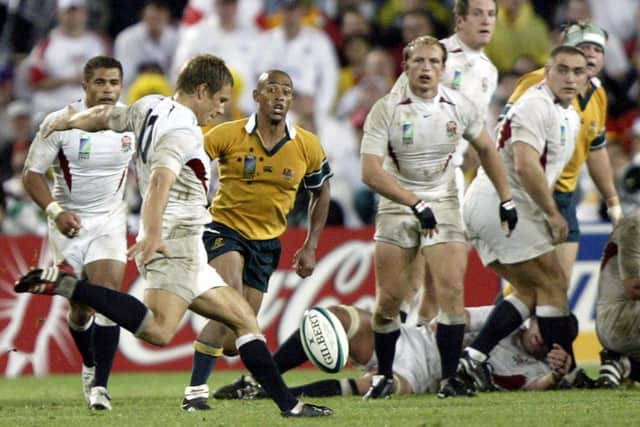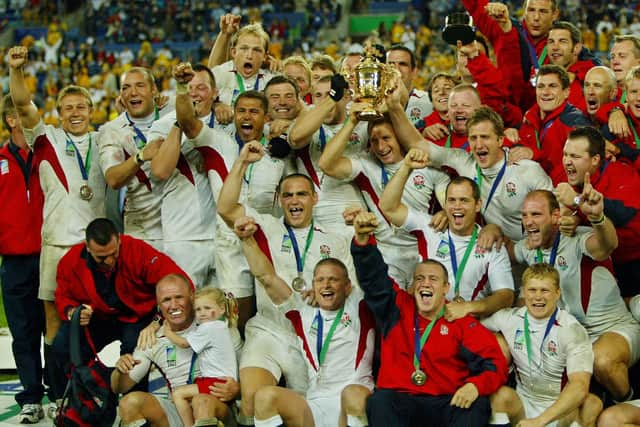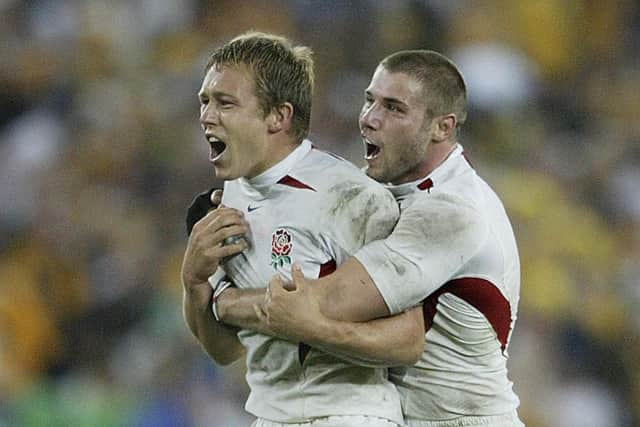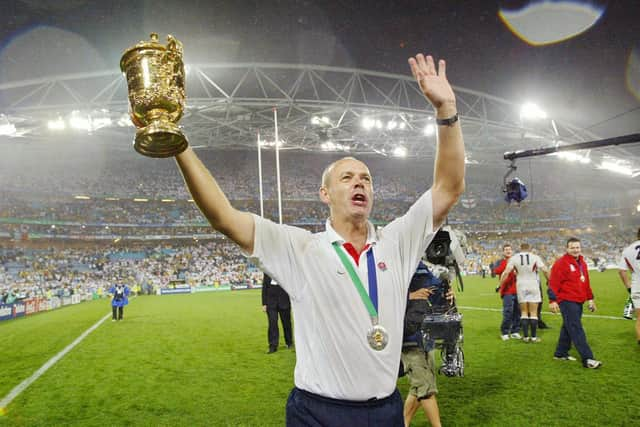English rugby greatest day: 20 years on from Jonny Wilkinson, Jason Robinson and 2003 World Cup glory
With the 2003 World Cup final in its 100th minute, and England and hosts Australia locked at 17 points apiece, the men in white shirts rose to the grandest of occasions to write their name in English sporting folklore.
In the cauldron of the Telstra Stadium, Steve Thompson threw a lineout dart to Lewis Moody and Mike Catt ran at Australia’s defence.
Advertisement
Hide AdAdvertisement
Hide AdMatt Dawson feigned a pass back to the waiting Wilkinson outside the 22-metre line, and then sliced through a gap to gain 15 crucial yards.
Captain Martin Johnson took up possession to eat a little further into the remaining seconds and grind the Australians further back.
Then scrum-half Dawson shimmied again to suggest he might try and gain a few more yards, waited for the fooled gold shirts to begin their retreat and then flung the ball to Wilkinson and the boy wonder of English rugby, on his weaker right foot, kicked the ball through the posts.
England were world champions.
“I’d had a couple of goes before which were very much pot-shots, having a dig almost,” Wilkinson said on the 10th anniversary a decade ago.
Advertisement
Hide AdAdvertisement
Hide Ad

“But for this one I was thinking that because of where the guys had put me, I can’t miss. This must go over.
“I knew I had hit it in such a way that it wasn’t going to be the most powerful kick, but it was going to be accurate. I knew from fairly early on it was going over.
“It felt like a surreal, dream-like situation. I had to ask ‘is this really happening?'”
Whatever mis-steps have been taken in the intervening two decades is not for debate today.
Advertisement
Hide AdAdvertisement
Hide Ad

Rugby union in England finds itself at a low ebb, with leading clubs going under and the national team a shadow of those glory days, which makes the high points all the more precious.
Did England do enough to build on the platform? What is the legacy of that achievement? Or is it just a wonderful memory to be cherished forever, one that has the power to send a shiver down the spine?
For the Wilkinsons, Johnsons and Jason Robinsons, it was a lived experience like no other, and one that ensures their fame and legacy to the end of their days.
Johnson was England’s immovable force on the field, an inspirational captain in so many ways.
Advertisement
Hide AdAdvertisement
Hide Ad

Winning the World Cup in Australia that year felt like his and that team’s destiny.
He would later be head coach of England, the latest in a growing line of people who have tried to take England back to the mountain top. He didn’t half the players at his disposal; men like Neil Back, Will Greenwood and a young Mike Tindall.
Wherever they go, these men are feted and asked to recall that glorious day and the journey they went on to get there.
As recently as September, Robinson was guest speaker at the first rugby union conference for Yorkshire held in Doncaster, one to address the problems affecting the game at local and national level.
Advertisement
Hide AdAdvertisement
Hide AdRobinson shared his views and his solutions, and then had the audience eating out the palm of his hand with stories from the 2003 World Cup.
“I go to events and forever see the clips with me sliding in, Jonny’s kick and Johnno (Martin Johnson) lifting the trophy etc, but I’ve never watched the game,” said Robinson.


“All I’ve ever done is play a game and then it’s on to the next game, the next game, the next game. That’s how life has been. I’ve probably been conditioned not to get attached to any one game.
“Funnily enough my eight-year-old wants to watch the final so at some point I’m sure we’ll stick it on and watch it in full.”
Advertisement
Hide AdAdvertisement
Hide AdRecalling the impact it had for a young man who grew up in Leeds who would go on to score England’s only try of the final, Robinson said: “It gave rugby a massive boost because it was the first time we’d won anything since 1966. It was fantastic for us as players and we got lots of opportunities off the back of it.
“There are very few days when someone doesn’t come to me and say ‘I remember where I was when…’
“And they start to tell the stories of what it meant to them and what they did as a result of it. That just shows that even 20 years on it’s still had such an impact, it’s been huge.
“Because it’s the 20th anniversary, I’m seeing a lot more of the boys. We’re doing a lot of stuff together and that’s been brilliant.
Advertisement
Hide AdAdvertisement
Hide Ad“When you get back together and start to reminisce, you learn stuff from each other even after 20 years – things like how you felt. It was a special time. The cameraderie is still strong.
“We are that special group to have won the World Cup and we’ll always be the first ones to have done it from the northern hemisphere. Winning it is the ultimate.”